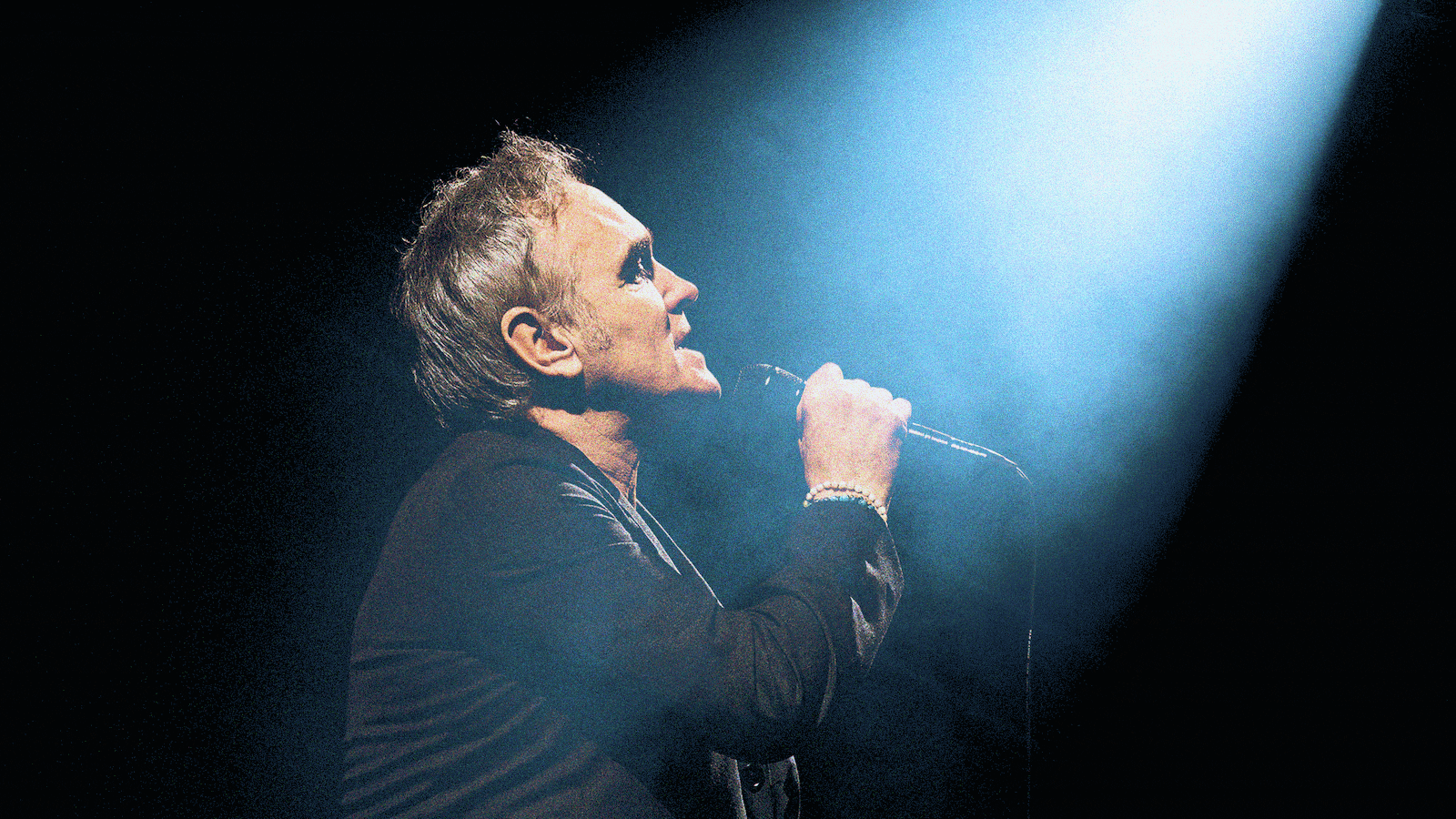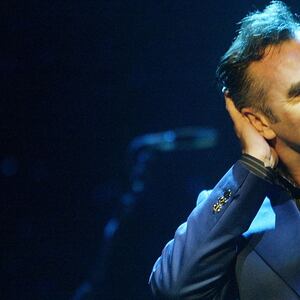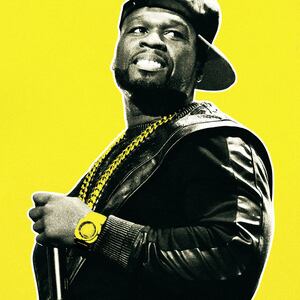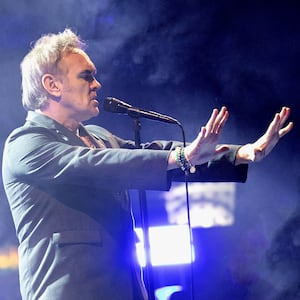Miley Cyrus wants off his new album. His record label and management company are no longer working with him. And his PR team tells The Daily Beast they haven’t repped him in years.
Once a thrilling rock icon, Morrissey’s views on everything from race and immigration to the #MeToo movement have turned him into the uncle at Thanksgiving dinner you have to profusely apologize for.
So how did the rock legend, who rose to fame as a symbol of downtrodden and disenfranchised youth, become Infowars fodder?
A Young Instigator
As the frontman of The Smiths, Steven Patrick Morrissey’s lyrics featured an explicitly anti-capitalist, anti-monarchy message derived from the bleakness of daily life in 1980s Manchester. But the lead singer himself has always been a reckless orator, spewing critiques of everyone from Madonna to Prince Charles seemingly without thought.
His controversial statements date back to the beginning of his career. In 1984, after the Irish Republican Army killed five people in a hotel bombing in Brighton, Morrissey lamented that the paramilitary group didn’t succeed in killing then-U.K. Prime Minister Margaret Thatcher. The conservative politician would become the target of his and other artists’ ire over the years.
“The sorrow of the IRA Brighton bombing is that Thatcher escaped unscathed,” he once said in an interview.
On the Smiths’ 1986 album The Queen Is Dead, the Manchester-born rocker openly mocked Queen Elizabeth and Prince Charles, singing on the title track, “Her very Lowness with her head in a sling / I’m truly sorry, but it sounds like a wonderful thing.” He even added in a quip about Charles in his mother’s clothes on the cover of the Daily Mail.
Morrissey’s public insults didn’t slow down after The Smiths disbanded. On his debut solo album, 1988’s Margaret on the Guillotine, he denounced Thatcher yet again. “The kind people have a wonderful dream / Margaret on the guillotine,” he sang on the title track.
Never one to hold his tongue, Morrissey has also sounded off on his fellow artists over the years, calling The Cure frontman Robert Smith a “whingebag” in a 1984 interview with British music magazine The Face. Years later, in a November 2017 interview with The Sunday Times Magazine, he referred to Madonna as a symbol of “desperate womanhood” whose work is similar to “prostitution.”
A Curmudgeonly Contrarian
As one of the most venerated icons in British music history—one who released four acclaimed albums with The Smiths and, as a solo artist, has released 13 albums, netted 10 Top 10 hits, and continued to sell out arenas—Morrissey has managed to keep himself in the headlines. But for the last decade, it’s mostly the artist’s outrageous comments, not his post-punk anthems, that have put him there.
Morrissey’s polarizing statements maintained a consistent tack as recently as seven years ago. He was still getting in trouble for careless left-wing commentary, like when, in a 2015 Larry King Live interview, he wondered aloud if Barack Obama was “white inside” after criticizing the then-U.S. president’s lack of action on police brutality.
Two years later, during the promo cycle for his 11th album, Low in High School, the singer said he was briefly investigated by the Secret Service for telling Der Spiegel that he would press a button if he knew it would kill Donald Trump. “I would [do it] for the safety of the human race,” he told the German news magazine.
Things took a turn from there. As U.S. conservatives bowed to Trump and Brexit fever took over the U.K., Morrissey followed suit with more publicly voiced conservative views. Paired with his word choice and temperament, Morrissey’s remarks slowly left his former fans disappointed and his industry peers reluctant to work with him.
In the same November 2017 interview with Der Spiegel, he took umbrage with the #MeToo movement. Asked if he’d been following the accusations against Kevin Spacey and Harvey Weinstein, he said: “Up to a point, yes, but then it turned into a play. Suddenly everyone is guilty. Anyone who has ever said ‘I like you’ to someone else is suddenly accused of sexual harassment.
“If I can’t tell someone I like them anymore, how will they ever know?” he added. “Of course there are extreme cases, rape is disgusting, any physical assault is repulsive. But we have to see it in proportion. Otherwise every person on this planet is guilty.”
Morrissey further defended Spacey, who had recently been replaced in the film All the Money in the World after he was accused of sexual assault by Rent actor Anthony Rapp, who said Spacey groped him when he was 14 years old. “I find that ridiculous,” Morrissey said. “As far as I know he was in a bedroom with a 14-year-old. Kevin Spacey was 26, the boy 14. That makes you wonder where the boy’s parents were.”
He doubled down on his controversial #MeToo views in an interview with The Sunday Times that same month, defining some instances of sexual harassment as “pathetic attempt[s] at courtship.”
His political views post-Brexit also riled up fans in his home country and elsewhere. He told Der Spiegel in 2017 that he believed Brexit was a “democratic victory” over the “political elite and establishment” as EU and U.K. negotiators continued to haggle over terms of withdrawal in Brussels.
Later, in a June 2018 interview with freelance writer Fiona Dodwell, Morrissey defended his support for the far-right, anti-Muslim (and now-dissolved) political party For Britain.
“For Britain has received no media support and have even been dismissed with the usual childish ‘racist’ accusation,” he told Dodwell. “I don’t think the word ‘racist’ has any meaning anymore, other than to say ‘you don’t agree with me, so you’re a racist.’ People can be utterly, utterly stupid.”
This was in line with other inflammatory ideas he discussed earlier that year. In an April 2018 interview posted on his website—his go-to medium for sharing his unfiltered thoughts—he criticized London Mayor Sadiq Khan’s speech. Khan, the first Muslim elected to lead the British capital, “cannot talk properly,” Morrissey claimed. Elsewhere in that same interview, he made comments about Adolf Hitler’s supposed political past. The “loony left,” he claimed, had forgotten that Hitler was “left-wing,” a common ahistorical talking point based on the Nazi party’s full name that is often spewed by conservatives.
Morrissey’s anti-Muslim rhetoric continued throughout the following year. In May 2019, the rock icon drew further criticism when he wore a For Britain pin on his lapel during a performance on The Tonight Show Starring Jimmy Fallon. Fallon also fell into hot water, as fans accused him of once again using his show to launder the reputation of a rich white man who trafficked in racism.
The next month, in an interview on his website conducted by his nephew, Morrissey praised the For Britain party and its leader Anne Marie Waters. He tacked on another questionable tangent, by now a staple of his public persona: “Everyone ultimately prefers their own race… does this make everyone racist?” he asked, presumably rhetorically.
So What About Miley?
Morrissey’s decades-long turn from rock darling to conservative spokesman seems to have soured some of his most important industry connections. He no longer speaks to his Smiths bandmates, long rejecting reunion offers. A legendary record store has banned his albums from its stock. Past collaborators (and fans) have disavowed him; record labels have repeatedly nixed him. Morrissey even sued one of the most recognizable music magazines, NME, for libel, after he claimed an article portrayed him as racist. And several artists have released songs mocking him.
Most recently, Morrissey has ruffled feathers with his record labels. In November 2020, he announced that BMG dropped him, citing the label’s “new plans for ‘diversity’” as the reason. BMG, for its part, released a simple statement wishing Morrissey “well in the next chapter of his career.”
In October of this year, Morrissey announced he had signed with Universal’s Capitol Records to release his new album Bonfire of Teenagers in the U.S. (He still lacked a record label abroad.) The record was said to feature vocals from Iggy Pop, Chad Smith and Josh Klinghoffer of the Red Hot Chili Peppers, and Miley Cyrus.
On Dec. 23, Morrissey announced on his website that he had “voluntarily” parted ways with Capitol as well as Quest Artist Management, which represents global heavyweights like Paul McCartney, Andrea Bocelli, and Shania Twain.
Neither Capitol nor Quest has responded to questions from The Daily Beast about what caused the separation.
The following day, the controversial rocker published a blog post titled “Miley Is a Punk Rocker.” Below a photo of the two musicians posing in a studio, Morrissey seemed to take issue with the former Disney star’s decision to renege on their collaboration.
“Miley Cyrus now wants to be taken off the song ‘I Am Veronica’ for which she volunteered backing vocals almost two years ago,” he wrote. “This comes at a time when Morrissey has disassociated himself with Capitol Records (Los Angeles), who control the hidden album ‘Bonfire of Teenagers.’”
Reached for comment on the latest news, a representative for Shore Fire Media, listed as his most recent PR firm, said it has not represented Morrissey for “a couple of years,” but declined to go into detail as to why.
Cyrus did not respond to requests for comment from The Daily Beast.
Some are also growing tired of Morrissey’s diva-like behavior. One longtime fan has taken to chronicling all the dates that the singer has abruptly canceled live shows in recent years, a pattern that predates COVID. Last month, fans were left upset after he walked offstage at the Greek Theatre in Los Angeles just 30 minutes into his set after complaining about the cold weather. A bandmate told the crowd: “Sorry, but due to unforeseen circumstances, the show is not going to continue. Very sorry. We’ll see you next time. Apologies.”
In an interview filmed at the The London Palladium last month, Morrissey said he has written an entirely new album that would be recorded soon, though those plans are likely up in the air as he seemingly attempts to get Bonfire of Teenagers released.
That album is now in the hands of Capitol, the singer said on his website. It remains to be seen whether it’ll ever see the light of day, and if it does, who will be there to hold the Morrissey banner as his track record gets harder and harder to defend.









